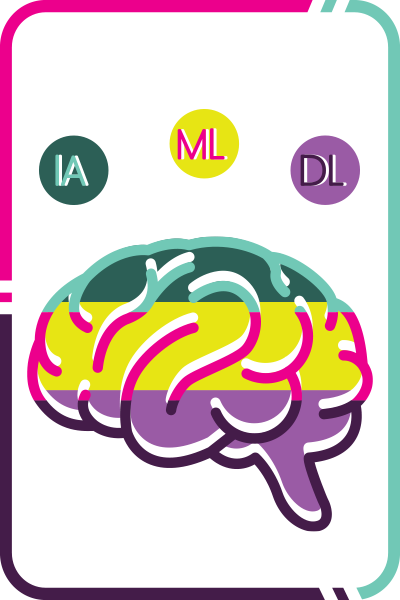* This article has been translated with a translation tool.

"If a machine is expected to be infallible, it cannot be intelligent" Alan Turing - father of theoretical computer science and pupil of John Von Neumann, designer of modern AI.
Comme c’est le cas pour les humains, les « machines » ou les ordinateurs apprennent de leurs erreurs. Toutefois, là où la machine à un avantage de taille, c’est que l’on peut utiliser les apprentissages déjà faits par d’autres machines pour arriver à un niveau de maturité beaucoup plus rapidement.
Whether you're aware of it or not, you're surrounded on a daily basis by devices that harness artificial intelligence:
- Facial or digital recognition on various devices
- Entertainment platforms and social media feeds
- Filters and detection tools (viruses, spam, grammatical errors) associated with our emails and texts
- Search engines and voice assistants
- GPS and route planning applications
The termartificial intelligence encompasses both Deep Learning (DL) and Machine Learning (ML). In fact, deep learning is itself a sub-category of machine learning. Did you know that AI uses these two important concepts ("Machine Learning" and "Deep Learning") to perfect itself and achieve better results? But what do these terms mean?
The Machine Learningis to give "machines" the ability to learn. Algorithms are used to process large quantities of data in order to identify trends, predict results and execute tasks. ML is active in fraud detection, predictive finance programs, weather forecasting and more.
The Deep Learninguses multi-layered networks of "neurons" (modelled on the human brain). It uses multiple structures of specific algorithms to automate more complex decisions that normally require human intelligence. It learns and improves automatically over time. DL is used for facial recognition, content delivery services, self-driving vehicles, such as the highly successful Tesla, text translation, etc.
Whether it inspires you or worries you, artificial intelligence leaves no one indifferent. Used intelligently, it can foster learning and innovation, improve our health and safety, better guide our decisions, and much more. It's up to us to seize this great opportunity and seek to make our interventions increasingly intelligent.
On your mark, get set, go!
OVATION team

